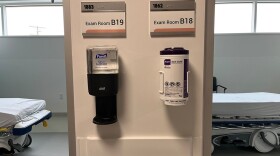A bipartisan group of lawmakers and behavioral health advocates want more oversight of substance use disorder treatment programs in New Hampshire.
Advocates say a new bill, sponsored by Sen. Sharon Carson, was drafted in direct response to NHPR’s investigation into sexual misconduct in the recovery community featured in the podcast “The 13th Step.”
“I think that the podcast really helped to kick start a conversation about what meaningful steps can be taken to really increase oversight and to hold people to higher standards of service and protect the health and safety of people in treatment,” said Jake Berry, vice president of policy at the health advocacy organization New Futures, which led the legislative effort.
In March 2022, NHPR reported multiple allegations of sexual misconduct involving Eric Spofford, the founder and then CEO of Granite Recovery Centers. Spofford denied the allegations and sued NHPR for defamation for the reporting. (A judge in that case has since said Spofford has “no viable basis” to sue NHPR.)
In June, NHPR released “The 13th Step,” a podcast by the newsroom’s Document team that included the reporting about Spofford and other stories about sexual misconduct in recovery communities beyond New Hampshire. Upon hearing the podcast, Berry said he thought, “Thank God. It’s about time.”
“For a long time, there had been whispers in the field and around the state, not just specifically around Eric Spofford and Granite Recovery [Centers], but around certain providers and how they treated patients and the quality of service they provided,” Berry said. “But I think there was a feeling that there was not a great deal that could be done at the time.”
In the weeks after the podcast was released, Berry said he and a group of substance use disorder treatment providers started working on legislation. The bill they came up with has two components: First, it would create a system to require any substance use disorder treatment provider to be certified by the New Hampshire Department of Health and Human Services. Addiction treatment facilities without this certification would not be allowed to operate in the state.
The bill does not lay out the specific requirements for the certification process, and directs state regulators to design the program if the measure passes. The state health department would also have to publish a list of certified programs and any reports based on investigations into facilities.
In New Hampshire, as in many other states, oversight of addiction treatment is a patchwork. The state requires certain providers, like clinical supervisors or drug and alcohol counselors, to be licensed. But not every addiction treatment employee is required to have a license. The state health department licenses facilities, such as residential treatment centers, though those licenses are more geared toward physical safety measures, such as fire codes and patient counts. Insurance coverage or grant funding can also come with their own sets of regulations. But, Berry said, the state doesn’t currently have a mechanism that ensures the “quality” of services provided.
Berry’s colleague, Michele Merritt, president of New Futures, said someone came to her recently with a complaint about a substance use disorder treatment facility in Manchester. Merritt, who has been in the behavioral health field for a decade, said she had never even heard of this facility before. Merritt said she was stunned to learn this facility had hired “recovery coaches,” who were less than 30 days out of a treatment program.
“Anybody who is working with people in recovery knows that is a dangerous period to be introducing somebody to someone who is not yet fully in recovery,” Merritt said. “You are not only putting your employee then at risk of a potential recurrence of their substance use disorder, but you're endangering every other person within that program.
“No treatment facility of any type of credibility that I know of in New Hampshire would be doing that,” she said. “And yet it's happening in Manchester, right now.”
The second component of the bill would create a new position within the state health department called a “behavioral health ombudsman.” A major part of this job would be fielding complaints about mental health or substance use treatment facilities and investigating them.
The health department currently has an ombudsman responsible for the whole agency. But advocates who worked on the legislation said there is a need for someone with a background in behavioral health who understands the particular needs and vulnerabilities of people who are seeking substance use disorder or mental health treatment.
Berry hopes the new ombudsman position could help change a “culture of silence within the substance use disorder treatment field.”
Cheryle Pacapelli, a project director at Harbor Care, was part of the initial discussions about this legislation. She said she and her colleagues are especially excited about the idea of a behavioral health ombudsman.
“If a family member called with a concern about any treatment provider in the state that was not under contract with the state, they had nowhere to make a complaint or express a concern about what had happened with their family member,” Pacapelli said. “So having this person in place will create some transparency and the ability for both family members and the state to again create the best services we can for our most vulnerable people.”
The legislature is slated to take up the bill during its next session in January. It currently has a list of cosponsors in both parties, including Senate President Jeb Bradley.
But for the most part, Pacapelli said she is glad people are finally talking about bringing more oversight to this field.
“I think that the reporting [NHPR] did was able to shine a light in a way that a lot of people knew stuff was going on, but never the details of how big it was,” she said. “So I think that [NHPR’s] reporting really prompted this legislation to get pushed forward in a way that otherwise may have taken many more years to do.”







